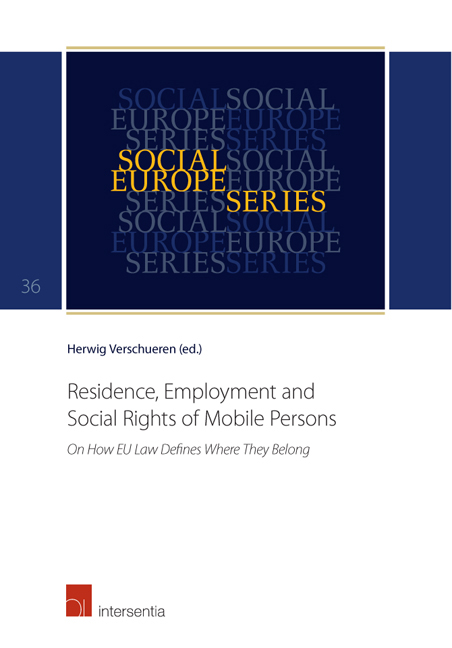Book contents
- Frontmatter
- Preface
- Contents
- List of Abbreviations
- List of Contributors
- Chapter 1 How EU Law Defines where Mobile Persons Belong. An Introduction
- Chapter 2 Family as Link. Explaining the Judicial Change of Direction on Residence Rights of Family Members from Third States
- Chapter 3 The Direction of the Court's Family Reunification Case-Law. A Plea for (Timely) Moderation
- Chapter 4 Sufficient Resources and Residence Rights under Directive 2004/38
- Chapter 5 Free Movement of Persons and European Solidarity. A Melancholic Eulogy
- Chapter 6 Once a Foreigner, Always a Foreigner. Who Does Not Belong Here Anymore? Expulsion Measures
- Chapter 7 Who Does Not Belong Here Anymore? A Statistical Snapshot of Member States’ Practices
- Chapter 8 Civic Integration Exams in EU Immigration Law. What Integration is Not in European Law
- Chapter 9 I Study Here, and Thus I Belong? Mobile Students in the European Union
- Chapter 10 Being Economically Active: How It Still Matters
- Chapter 11 Where Do EU Mobile Workers Belong, According to Rome I and the (E)PWD?
- Chapter 12 Conflicting Rules of Conflict: Social Security and Labour Law
- Chapter 13 Conflicting Rules of Conflict: Social Security and Labour Law. A Response
- Chapter 14 Where Does the UK Belong?
Chapter 8 - Civic Integration Exams in EU Immigration Law. What Integration is Not in European Law
Published online by Cambridge University Press: 22 September 2018
- Frontmatter
- Preface
- Contents
- List of Abbreviations
- List of Contributors
- Chapter 1 How EU Law Defines where Mobile Persons Belong. An Introduction
- Chapter 2 Family as Link. Explaining the Judicial Change of Direction on Residence Rights of Family Members from Third States
- Chapter 3 The Direction of the Court's Family Reunification Case-Law. A Plea for (Timely) Moderation
- Chapter 4 Sufficient Resources and Residence Rights under Directive 2004/38
- Chapter 5 Free Movement of Persons and European Solidarity. A Melancholic Eulogy
- Chapter 6 Once a Foreigner, Always a Foreigner. Who Does Not Belong Here Anymore? Expulsion Measures
- Chapter 7 Who Does Not Belong Here Anymore? A Statistical Snapshot of Member States’ Practices
- Chapter 8 Civic Integration Exams in EU Immigration Law. What Integration is Not in European Law
- Chapter 9 I Study Here, and Thus I Belong? Mobile Students in the European Union
- Chapter 10 Being Economically Active: How It Still Matters
- Chapter 11 Where Do EU Mobile Workers Belong, According to Rome I and the (E)PWD?
- Chapter 12 Conflicting Rules of Conflict: Social Security and Labour Law
- Chapter 13 Conflicting Rules of Conflict: Social Security and Labour Law. A Response
- Chapter 14 Where Does the UK Belong?
Summary
INTRODUCTION
The relationship between integration policies and EU migration law has taken unprecedented forms in the last decade of European integration. During the negotiations over the first pieces of EU secondary legislation covering the conditions of entry and residence of third-country nationals (TCNs) in the EU in the early 2000s, a new approach to integration made its way into Directives 2003/109 on the status of third-country nationals who are long-term residents and 2003/86 on the right to family reunification. This approach makes use of integration policies as criteria for access to EU rights and freedoms by TCNs. Integration functions as a legal requirement or migration control tool over socio-economic inclusion, security of residence, and family reunification. The academic literature has qualified this mutation as a ‘paradigm shift ‘ from past normative approaches to integration developed since the 1970s in EU law and policy. Indeed, integration policies used to mainly focus on the facilitation of mobility through non-discrimination, respect for family life and security of residence. Lately, however, integration has become a new ground for exclusion of foreigners in the EU's management of human mobility and identity.
Two novel formulations of this control-oriented approach to integration can now be found in Directives 2003/109 and 2003/86, i.e. ‘integration conditions’ and ‘integration measures’. Integration conditions are used in Article 5 Directive 2003/109 for the acquisition of long-term resident status, while integration measures are present in Article 15(3) Directive 2003/109 (which specifies the conditions for residence in a second Member State), and Article 7(2) Directive 2003/86 (stipulating the requirements for the exercise of the right to family reunification). The scholarly debate has engaged with the meaning and differences between the scope of integration ‘conditions’ and ‘measures’ in the Directives and EU immigration law more generally. It has also paid attention to the legality of EU Member States’ integration policies implementing them into their respective legal systems through the use of mandatory integration programmes, tests/exams and contracts. A key controversy in scholarly and policy debates has been the extent to which EU Member States could lawfully apply obligatory civic integration programmes conditioning access and/ maintenance of EU rights by TCNs to passing an exam on knowledge of the receiving country's language and ‘societal values’.
- Type
- Chapter
- Information
- Residence, Employment and Social Rights of Mobile PersonsOn How EU Law Defines Where They Belong, pp. 129 - 160Publisher: IntersentiaPrint publication year: 2016



